- Home
- Tim Tingle
A Name Earned Page 7
A Name Earned Read online
Page 7
We expected him to ask us to join hands before sending us back to the court. But this was a night of surprises, and one more awaited us.
“I have invited a guest to speak to you, so show him your respect,” he said.
He opened the dressing room door and said, “The men are ready for you now.”
Mr. Blanton stepped into the dressing room. The same Mr. Blanton who had threatened Coach with a chair and shattered his glass window.
CHAPTER 17
Standing at the Gates
He stood before us with a shy look on his face, one we’d never seen. He shook his head and glanced over at Coach.
“Oh, Coach,” he said with a smile, “this is very strange. I feel a little like I’m standing at the Pearly Gates. But instead of Saint Peter deciding who gets to enter, I’ve got to convince a bunch of teenage boys that I’m worthy.”
We all had to laugh at that one. Even Coach. Even Mr. Blanton.
“Give it a try,” Coach Robison said.
“Alright,” he began, turning back to us. “You are young men. Good young men. And I have always thought of myself as better than you. I was your boss. I didn’t care a thing for how you felt or what you thought. I didn’t give a damn.
“And as Lloyd grew up, I had to show him I was still the boss.”
He paused and took a deep breath, looking again to Coach.
Coach nodded and gestured for him to continue.
“I woke up last Saturday morning in jail. And for the first time I looked at myself as others were seeing me. So I came here for two reasons. First, I want you to forgive me and give me another chance to be a part of my son’s senior year.
“And second, I want you to win this game for your coach. He has opened my eyes that I might see. And boys,” he added, “know that your mother and your father both love you, whether you win or lose. And what you do on the court does not—in spite of what everyone says—stay on the court. It carries over into the court of life, the real court.
“And never forget, the court of life begins the day you are born and continues till the day you die. You are given a name at birth. But you are also given a name that will stay with you, sometimes for many years after you have fought and struggled to leave it behind. They might call you hardworking. They might call you tough as nails. They might call you deaf, dumb, and blind. They might call you a fighter.”
He paused and looked at Coach, took a deep breath, then continued. “They might call you a drunk. But never forget. You earned your name. They didn’t make it up. You earned it. And all I am asking you to do tonight is earn your name. A name earned will never be forgotten.”
Mr. Blanton closed his eyes and waved his hands in front of his face, unable to continue. We sat before him, as his whole life flooded the room.
Coach Robison gripped his shoulder and shook his hand.
“Never forget the words of this good man,” he said. “Your life is carved by the choices you make. You earn your name by your actions.”
“Thank you, Coach,” he said, eyes closed and head bowed.
“I think you have earned a name, Mr. Blanton. The Choctaw word for tree is iti, and chukma means ‘good.’ And you, Mr. Blanton, are the strongest, stoutest tree we know. Iti Chukma, a good, strong tree.”
He turned to us. “Say it with me, boys. Say it to Mr. Blanton. He has earned his name.”
“Iti Chukma,” we all said, nodding with respect at Lloyd’s dad.
“I will try with all my strength to be worthy of this name,” said Mr. Blanton.
“Now,” Coach Robison said, “let’s join hands and win this game. Mr. Blanton, please join us.”
“Yeah!” we shouted, and on our way to the door, every Panther patted Lloyd’s dad on the back and said good things to him.
“Nice going, Mr. Blanton.”
“Glad you’re with us.”
“Lloyd has a good dad.”
“You don’t need our forgiveness, but you got it.”
“Get Lloyd well. We need him back.”
“Stay cool.”
“Lloyd,” Coach shouted, “lead us to the court. You and your family!”
Lloyd was now walking, or limping at least. As the crowd cheered to welcome him, his parents took their place in the bleachers above us. Soon the refs blew their whistles and the second half began.
“Keep up the pressure,” Coach urged as we took the court.
We circled at midcourt for the tip, and my defender cross-stepped in front of me and shoved me aside.
“So we’re gonna play that way,” I said.
Johnny gave me a what are you doing? look.
Maybe I did step over the line, I thought. Stay cool. But I also knew that if that same “Eagles attitude” continued into the second half, we could beat these guys. They could push and shove, mouth off and hack, but take away their star player—they couldn’t back it up.
Johnny lost the tip, and Jimmy’s man grabbed the ball. He tossed the ball to their playmaker, who dribbled slowly across court.
“Play tight,” Coach Robison shouted. We heard his real message.
They might try to slow the game down, but don’t get lulled to sleep. We hustle on D and run when we have the ball.
Again they lobbed the ball to the post, ten feet from the bucket on the right baseline. Out of habit he turned, looking for Danny cutting under the hoop. But Danny was sitting on the team bus, listening to the game on the radio.
Their second-team post man tried to cut to the ball, but Jimmy intercepted and we dashed to our goal.
Panthers, Panthers! Go! Go! Go!
Our crowd was already into it, stomping and cheering. Jimmy hit me at midcourt, and I threw it to Johnny speeding in from the baseline. He caught the ball with one hand and fired it to Bart at the free-throw line. Bart missed, but Johnny got the tip-in.
I know we are fast, but when the game began, we were no match for the Eagles.
Where were they during our fast break?
Two Eagles were jogging downcourt, still arguing over whose fault it was, our intercepting the pass.
“Nice going, men!” Coach shouted. “Don’t let up!”
By the end of the third quarter, we had extended the lead to twelve. Panthers 54–Eagles 42.
Then exhaustion set in. I found myself looking to the bench. My chest burned and I was puffing hard.
“Keep pushing!” Coach shouted, every time we touched the ball. Lloyd, Bart, and I could play either point or shooting guard, so we had time to catch our breath during every game. But we had no Lloyd.
This will take some getting used to, I thought. Not good.
“You gonna be hoke?” Coach asked as I ran by the bench.
“I’m fine,” I lied.
Coach called a quick time-out.
“Men, we’ve got a nice lead. I’d love to tell you to keep running. That’s how we built the lead. Let’s drop back on the press. Pick ’em up at midcourt. Play tough, tight defense. Make them work for every shot. And when we get the ball, take some time off the clock. Walk the ball up court. That doesn’t mean don’t hustle. We clear on that?”
“Yes, sir!” we shouted.
What happened next came as no surprise.
Everybody in the gym could see we were exhausted. And we were a six-man team. Our bench players worked hard. But shooting the ball, dribbling the ball—hey, you can’t have everything!
And how do you turn up the fire on a team with no bench?
Full-court press.
Yikes! Our ball under the Eagles basket. Bart, our shortest player, took the ball out of bounds. The long-armed Eagle post man waved his hands back and forth in Bart’s face. I stepped out of bounds and called for the ball.
“Throw it to me!”
Bart flipped the ball to me, and I threw a long pass to Jimmy. He leapt high for the ball at midcourt and took one hard dribble, moving quick to the basket.
Cherokee Johnny suddenly appeared, to the joy of Coach.
“
Yo, Jimmy!” he called out, lifting his arms to the ceiling. Jimmy got the message. He dribbled a slow step back and waited for me to cross half-court.
Slow it down. Run some clock. Protect our lead.
My man went for the steal, diving for the ball and hacking me on the wrist. He slapped hard, and my hand stung.
I’ll feel that in the morning, I thought. Two free throws and nothing but net lessened the pain.
The final quarter was the longest eight minutes of basketball I’ve ever played in my life. I had to remind myself that basketball is fun! Then my legs and back and lungs would scream, “Basketball is work!”
We finally pulled it out.
Panthers 68–Eagles 60.
“No partying tonight, men,” Coach Robison announced after the game. “Let’s take the weekend off, and I’ll see you Monday. A great win tonight.”
When he left the dressing room, I knew he was going to check on Lloyd and his dad. It was different celebrating a victory without Coach. Soon it became more than different. The assistant principal, Mr. Walters, entered through the coaches’ office.
“Listen up!” he shouted. He didn’t have to say it twice. “Coach Robison asked me to tell you that he won’t be back this evening, so I’ll stay and lock up.”
We knew this meant hurry up, so we did. We got dressed and were soon saying our goodbyes in the parking lot.
“Hop in. Let’s go,” Johnny said, pulling his car to the curb.
“Not yet, Johnny. Go on if you want to. I’m not leaving yet.”
“What’s going on?” Johnny asked. He parked and joined me on the sidewalk.
“I’ve got a funny feeling,” I said. “Something is just not right. Coach Robison’s car is still here, but he’s not. He was checking on Lloyd. I’m afraid something happened.”
Less than five minutes later, a cab pulled to the curb and Coach Robison jumped out.
“I’m glad you boys are still here,” he said. “Come get in my car. I’ll call your parents. We’re going to the hospital.”
“Is Lloyd hurt bad?” I asked.
“Much worse,” Coach said. “It’s his dad.”
CHAPTER 18
Candle in the Dark
We climbed in his car, buckled our seat belts, and waited. For way too long we waited. Coach sped through every yellow light and paid no attention to speed limit signs. This was not the Coach we knew.
He finally told us why.
“I walked with Lloyd and his parents to their car after the game. After he helped Lloyd into the back seat, his dad fell against the car. ‘I’m hurting,’ he said. Then he passed out, and I called 911.”
Coach turned on his blinker and took a left onto the highway.
“I rode with him, Lloyd, and Mrs. Blanton in the ambulance to the hospital.”
“Is he gonna be hoke?” Johnny asked.
Coach Robison took a deep breath and gripped the steering wheel with both hands. He shook his head back and forth, not wanting to hear his own words.
“He had a heart attack. He’s in the emergency room now.”
“How is Lloyd?” I asked.
“He is pacing up and down the waiting room, doing his best to hold it together. When he started sobbing, I grabbed him and buried his head in my chest. So they wouldn’t ask him to leave.”
“Is Mr. Blanton going to make it?” I asked.
More waiting.
Johnny reached over from the back seat and patted my shoulder. He was as scared as I was. For Lloyd.
“They were considering open-heart surgery when I left,” Coach said. “I had to see if any of you boys had heard anything. I’m so glad you two waited. Lloyd needs you now more than ever.”
“We are there for him, Coach,” Johnny said.
I hesitated asking, but I had to know.
“And Heather?”
Coach laughed out loud and slapped the steering wheel. “Now that’s a good question,” he said, puffing his cheeks, blowing air, and leaning back, still laughing.
“Did I say something wrong, Coach?”
Coach glanced at me with a smile. “No, Bobby. You’re just walking the Choctaw road. A little humor lightens the tragedy, achukma.”
“Mind telling a less-informed Cherokee what you two are talking about?” Johnny asked.
“Heather, Lloyd’s girlfriend. Yes. She was close by when Lloyd’s dad fell. And so was Miss Popcorn.”
“You mean Faye?”
“Oh, is that what you call her?” Coach asked. “I thought her Choctaw name was Miss Popcorn.”
How can this be happening?
We all had to laugh at that one.
“Yes,” Coach continued, and his voice took on a serious tone. “Heather was there. She waited till the ambulance arrived and ran for her car, to follow us to the hospital. Faye was still standing on the sidewalk, looking back and forth at the action all around her. She didn’t know what to do.
“Heather pulled up to the curb and grabbed her arm. ‘You’re coming with me!’ she shouted. So we all drove away together.”
“And now?”
“Heather and Faye are sitting together in the waiting room.”
“That reminds me of something Dad used to say,” I said.
“I know,” Coach said. “I heard him say it a hundred times at the bar. Usually after a kickoff return or an interception runback for a touchdown. He’d take a swig of beer and say, ‘The good Lord takes a strange path, His miracles to perform.’ Is that it, Bobby?”
“That’s close,” I said.
We soon arrived at the hospital. Coach parked in the “Emergency Room Only” parking lot and hurried us inside. There was a crowd in the waiting room, friends and family of the Blantons. They were well known and well liked.
Lloyd was lingering in the hallway by himself.
“Say hello to your friends, Lloyd,” Coach said, then stepped into the waiting room to leave us alone.
“How’s it going, Lloyd?” I asked.
“Open-heart surgery,” he said. “They’ve already wheeled him away.”
Nothing to say.
Nothing would make this right.
So we did something teenage boys never do. Never.
We huddled together in a warm, arm-wrapping hug.
Till we couldn’t breathe.
“Can I call Jimmy and Darrell? And Bart too?” I asked. “We need our starting six—here and together.”
Johnny made the call.
“Are they on their way?” I asked.
“Yes. Jimmy agreed to pick the others up. They should be here soon.”
“Had they heard anything?” Lloyd asked.
“No. They were as shocked as we were. But they’re coming.”
Coach stepped from the waiting room and motioned to Lloyd. “The head surgeon wants to meet with the family,” he said. “They’re waiting for you.”
We followed him to the waiting room and watched as he stepped through the doors labeled “Medical Personnel Only.”
Twenty or more people crowded into the tiny space. No one said a word. I lowered my head and let my eyes gaze around the room. A married couple squeezed each other’s hands and stared straight ahead. An elderly lady buried her face in a handkerchief, sobbing quietly.
When Lloyd shouted, everyone jerked and looked back and forth, looking for answers.
“Noooo! You can’t give up. He is my father. He is not dead!”
Coach stood and approached the door, but he never entered. Lloyd flung the doors open and half ran through the waiting room, banging his fist against the door as he dashed to the hallway.
We followed Coach to the hall, then paused.
Jimmy, Bart, and Darrell held Lloyd. “The doctor said there is very little chance that Dad will live. He has blockage in every artery going to his heart,” Lloyd said. No crying. His face sported a determined look.
I glanced at Coach and saw the pride in his face as he bowed his head and closed his eyes. Heather soon joined us, followed by
Faye.
“Please,” said Coach. “Everyone wait here. I will be back in a moment.” He approached the nurses’ station. After a brief conversation, he was motioned down the hall.
Ten minutes later he returned.
“They are continuing treatment to flush out the arteries,” he said. “We may know soon, I was told. But it could take hours.”
“Coach,” Lloyd said. “The surgeon who spoke to us seemed to have no hope. And I know I should never holler in a hospital. That’s the kind of thing my dad would do. But something changed when I did. The doctor got that same look that you have, when it looks like we don’t have a chance.”
“There is always a chance,” Coach said.
“Yes. And Dad deserves another one.”
“Johnny,” Coach said, “can you take the first watch?”
“Sure, Coach. What do you want me to do?”
“Go back to the waiting room. Stay close to the door to surgery. If the doctor calls for the family, call Lloyd immediately.”
“Yes, sir.”
After the longest hour of Lloyd’s life, his phone finally rang. It was Johnny.
“Will you say that again?” Lloyd asked. “I want to put you on speaker phone.”
“Be glad to,” Johnny said. “Lloyd, the surgeon says your dad would like to speak to you.”
“I’m on my way,” Lloyd said, leaving us behind in his full-speed sprint to the basket.
“Looks like his ankle has healed,” Jimmy said.
We hurried down the hall, only to be met by another miracle.
My dad stood holding the door open for us.
“The Lord works in mysterious ways, His wonders to perform,” Dad said.
CHAPTER 19
First Time for Everything
Lloyd’s dad proved to be as strong as a tree—Iti Chukma, a good tree. Soon after Lloyd hurried through the doors for a few words with his dad, the surgeon appeared. He removed his gloves and handed them to an aide. When he turned to us he took a deep breath and shook his head back and forth, an adult way of saying, “I’m not believing this.”
We waited.
“Mr. Blanton has severe blockage in the left descending artery,” he said, “and he’s very fortunate. We have inserted a stent to restore blood flow, and he should be fine. We’ll keep a close watch on him, monitor his heart rate, and check vital signs. All things going well, he’ll be discharged and soon begin cardiac rehab.”

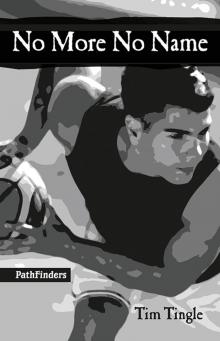 No More No Name
No More No Name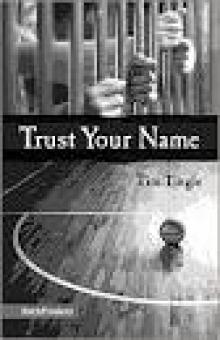 Trust Your Name
Trust Your Name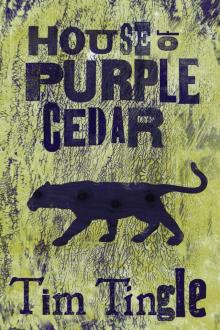 House of Purple Cedar
House of Purple Cedar NO-NAME
NO-NAME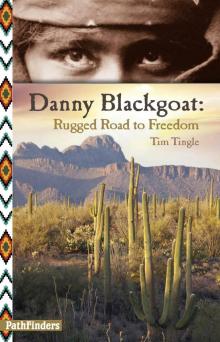 Danny Blackgoat: Rugged Road to Freedom
Danny Blackgoat: Rugged Road to Freedom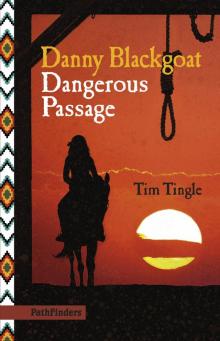 Danny Blackgoat
Danny Blackgoat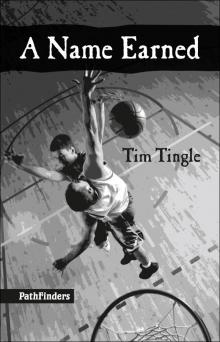 A Name Earned
A Name Earned Letter to Belinda
Letter to Belinda Danny Blackgoat, Navajo Prisoner
Danny Blackgoat, Navajo Prisoner